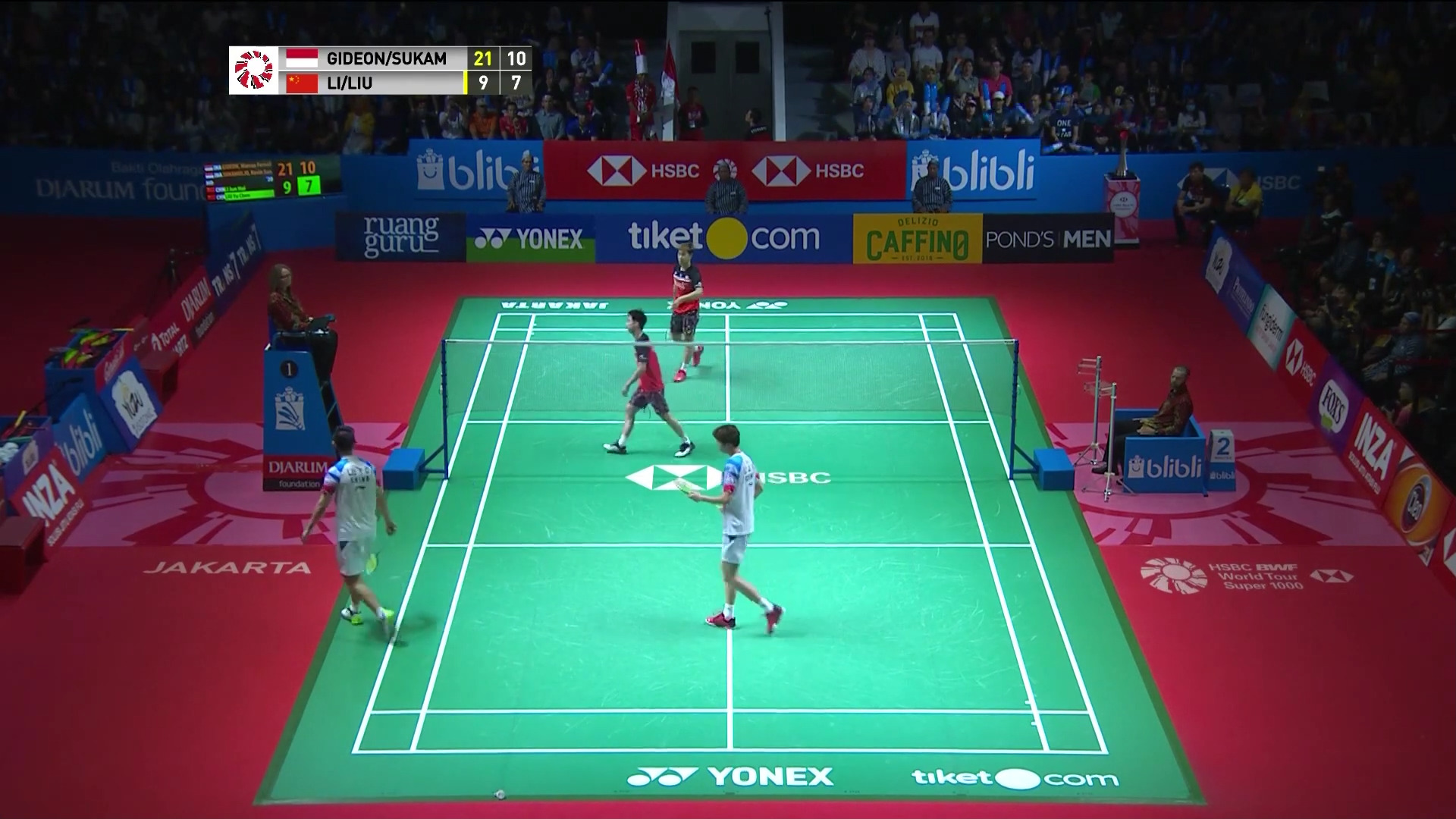She was correct to deny the challenge in the semifinals. §4.1.8.2.1 clearly says:
The COCTales and unwritten instructions to the umpire clarify that this really must be immediately, and certainly before the new score is announced.
The shuttle lands on the floor at 27:21 minutes into
the BWF video.
2 seconds later, the stream cuts away, with this picture:
None of the Chinese players has raised their hands, and everybody is going for their interval break.
The announcement
Service over, 11-7 interval starts at 27:27. We don't see it, but apparently Li/Liu only then challenge. That's far too late.
This incident and the consistent and correct handling be the umpire may very well have
caused the referee to appoint her for the finals.
How can an experienced umpire with the highest qualification make such a silly mistake? Well, we see airplane pilots making
silly mistakes all the time, and they've trained in a much more professional setting. So first I'd say that this kind of total blackout happens from time to time to every human.
Specifically, in this case I believe the umpire simply
confused the sides. When Anders Antonsen went over the net with his racket, he did obstruct Chou Tien Chen, and that would have been a reasonable (if slightly unusual) call.
When I started umpiring, this happened regularly to me. On the first day, often the first matches, of a tournament, I'd award a point to the wrong side. Later, I got the routine, got to know more players, and developed tricks such as picking one player from a doubles, so that I'd just have to decide whether John or Jim won the point, not which doubles pairing.
Electronic scoring devices also significantly reduce this kind of mistake, because it's easier to see who's on which side, so you completely eliminate the problem of confusing the sides. Also, the device reduces your workload significantly; you just press a button instead of writing a number in the right row and column. You start making mistakes when your mental workload is high – that's why airplane pilots make mistakes not in level perfect flight, but when some random part breaks and starts spewing error messages.
An additional effect is that you really can't remember the last rally as an umpire. Sure, if you concentrated on remembering it, then you could do it, but there are many other things to do. So once you have entered the score, you only have a faint recollection of what happened. (Same as any spectator if I'd ask them after a random rally, I suppose.) In contrast, the audience sees lots of detailed – often slow-motion – replays, which may make the mistake way more obvious.
This may be the reason of why the service judge (not line judge) did not intervene. Also, you don't really want to correct umpires on international television unless absolutely necessary, because doing so would totally undermine the authority of the umpire for the rest of the match. And what if the service judge would be wrong? Then you'd look like a fool. So it takes a lot of courage to stand up an go to the umpire, and doing so could have detrimental effects on all TOs. That's a
huge hurdle. Maybe we should allow the referee to talk to the umpire, or have a video IRS.
These very high-level umpires are already umpiring a lot. Sure, as a professional you would umpire and train even more, but as seen with the example of pilots, you never totally eliminate this kind of error; just maybe half or quarter its probability.
Professional umpires would be great, but you have to be realistic with the budget:
The
2018 BWF annual report is glossy and does not contain details, but the
2017 one was much more specific.
Total budget for tournaments is about 14300 k$ (14.3 Million, but I will just use kilo-Dollar for easier comparison). TOs (referees + umpires + line judges) used to be about 200k$, but with the introduction of semi-professional referees, the total TO budget has swollen to about 800k$.
If you just want professional umpires/service judges on semi-finals and finals day, you probably need to have around 10-20 people at the tournament (20 grants you the luxury of everybody just having one match per day, which may increase focus on that match). You may also want to introduce a video IRS, and some people will have vacations, injuries, sickness etc., so in total you probably need 30-40 people, including assessors, managers, HR, and secretaries.
On average, there is about one tournament per week. To fly 20 people to 50 tournament for flight costs of $500 each, BWF would have to pay 500k$ for flights alone.
Let's say every umpire earns about 50k$. Including taxes, pensions, and various minor expenses, let's say total cost per person is 80k$. With 40 people, this means in addition to the flight, the TO budget would increase by 3200k$. The TO budget would jump from currently ~5% to ~30% of total tournament budget.
Where would that money come from? Would you cut advertising? Use cheaper video equipment? Have fewer technical support staff and thus more technical interruptions?
You could also change the income side: If each of the 50 tournaments draws 5000 spectators, then you'd only need need to increase ticket price by 15$. Would you pay 15$ to have slightly better umpires, making 5 instead of 20 mistakes in high-profile games per year?
It's not impossible that BWF makes huge strides in their sponsorship deals and actually would be able to afford professional referees and umpires some day.
And it's not like the current umpires only umpire 3 times a year. They have to umpire a minimum number of matches. Many are also serve at national-level tournaments, which gets them much more practice, since the pause in between matches is much shorter there.

